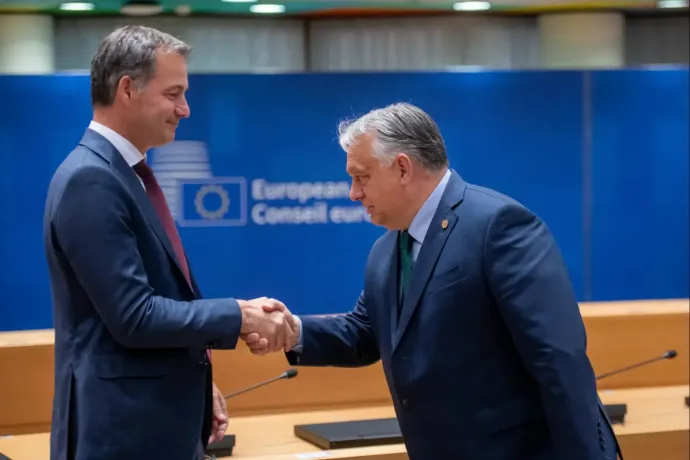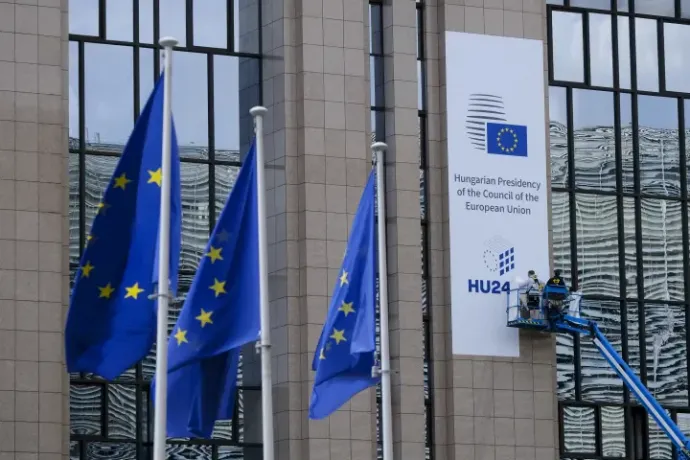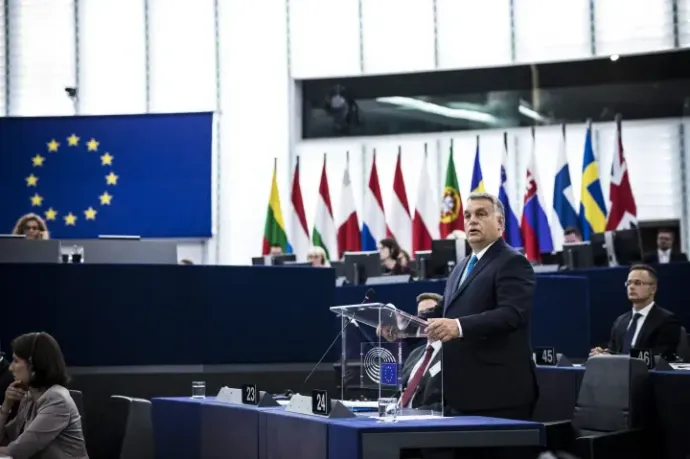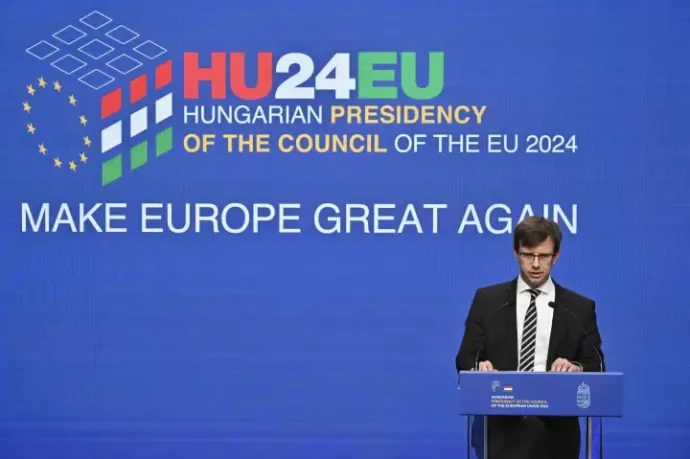Hungarian EU Presidency likely to bring about a number of odd situations

From Monday 1 July, the Hungarian government is taking over the rotating presidency of the Council of the European Union. "The presidency does not mean that you are the boss of Europe," the leader of the Belgian government, which held the previous presidency, Alexander De Croo, warned Viktor Orbán ahead of the changeover. János Bóka, Hungary's EU minister for professional affairs is among those also aware of this, describing the post in May as "not presiding over the EU or leading the Council, but rather performing certain coordinating, representative tasks and participating in setting the agenda".
The presidency may bring a number of oddities: for example, one of its first tasks will almost certainly be to – among others- – launch a new case against the Hungarian government. If it does not want to lose hundreds of billions of forints in funding, then the Hungarian government will need to have the member states' ministers assess how it has done when it comes to meeting the rule of law requirements. There is also a chance for the Hungarian government to take legal action against the body it is presiding over.
The presidency's influence is limited, but not zero
The position is partly really about the gray background work in one of the EU's two decision-making bodies. It's up to the current president to steer the various pieces of EU legislation towards their intended purpose within the body, while also hammering out as much consistency as possible between member states. As De Croo said: "At least once in a lifetime, it is interesting to be in a position where one has to be the one to reach compromises, so I can definitely recommend it to Mr Orbán".
The rotating presidency lasts six months, while even a not very controversial regulation or directive is usually chewed over for a year to a year and a half. This inherently limits how much influence a presidency can have, and in principle it is not possible to meddle in EU legislation at the whim of a government. It is no coincidence that Hungarian government officials have been throwing around phrases such as loyal cooperation or honest mediator: these are EU principles that the presiding country must live up to. Moreover, for example, even if one were to push a pro-China position, matters relating to foreign affairs are decided unanimously.
The six months starting in July are shorter than the first six month period, as this time includes the summer break in August and the December holidays, so there are fewer sessions. Additionally, it also coincides with a major institutional overhaul following the European Parliament elections.
The Hungarian presidency has already missed the opportunity to influence the allocation of important posts, as these were decided by the heads of state and government days before the presidency began. Once again, the European People's Party's top candidate, Ursula von der Leyen has been nominated as president of the EU Commission, with Orbán having been the only one to vote against. The Socialist António Costa will lead the European Council, while Kaja Kallas, who has repeatedly criticized Orbán, will be nominated as EU High Representative for Foreign Affairs, even though the Hungarian Prime Minister abstained during the vote. However, the leaders' meetings are prepared by the Council.
The Belgian presidency sought to finalize as many laws and initiatives as possible, and aimed to leave as few as possible for the next term so that the work on them wouldn't be paused during the transition following the EP elections. This also means that there is less work for the Hungarian government to do, but press reports suggest for example that in the case of the opening of accession talks with Ukraine, the Belgian presidency hurried to make sure that the matter is not left for the Hungarian presidency. The Council will therefore not have to deal with the Ukrainian accession process for a while, as the European Commission will first have to examine the candidate country's legal system. Hungary's EU affairs minister, János Bóka, suggested that this would probably not be done quickly enough to bring the issue up again in the Council during the Hungarian presidency.
The Council will have to decide on legislation in cooperation with the European Parliament, but as the EP is also being reshuffled, it is expected that it would only reach the point where it is ready to negotiate and appoint the representatives responsible for the legislation, such as the rapporteurs, only towards the end of the Hungarian presidency. (Although the EP has repeatedly debated the Hungarian government's suitability for the presidency in the past, it did not go so far as to boycott cooperation altogether.) In total, there are 30-35 pieces of legislation already in trilogue negotiations with the EP and the European Commission, waiting for their final versions to be worked out.
This leaves the legislation where ministers have not yet decided exactly what text they would like to see: there are around 50 of these, and the presidency can work on them straight away. Some of them were proposed too late to be finalized, but the rest are such tricky matters that even previous presidencies have been unable to cope with them, some have even been dragging on for nearly a decade. Work may continue at a lower level too: there are expected to be about 100 meetings of EU "ambassadors" which prepare ministerial meetings, and about 1,500 meetings of working groups which are one level below these.
The presidency to focus on seven main areas
The presidency has been well prepared politically: Bóka has discussed it with practically all member states, and before it began, Viktor Orbán visited several major EU countries, including France, Germany and Italy for negotiations. It may also be helpful that Bálint Ódor, Hungary's Deputy State Secretary for EU Affairs during the 2011 Presidency, is currently heading Hungary's Permanent Representation to the EU which will play a key role in managing the Presidency. As is customary, the number of staff at the "embassy" has been increased.
The presidency also publishes a programme, which largely carries the already launched initiatives forward, but it can also introduce aspects and elements that are important to the government concerned. As for the Hungarian programme,
- competitiveness
- and the development of the defense industry;
- partnership agreements with non-EU countries to curb migration;
- a "farmer-centered agricultural policy"
- and the future of cohesion policy
are all elements that are a priority at EU level but are also important for the Hungarian government. Addressing demographic challenges (such as depopulation) has also been included among the objectives. A further priority is the speeding up of the enlargement process towards the Western Balkans.
According to Bóka, their goal here is to move further ahead than any other member state would. However it is precisely the Northern Macedonian VMRO-DPMNE, which enjoys "excellent political cooperation" with Fidesz, that could become an obstacle to this. The party of Nikola Gruevski, who notoriously fled to Hungary with the help of the Hungarian authorities, was returned to power in May. They oppose a planned agreement with Bulgaria to recognise the Bulgarian minority as a constituent part of the state, and the new president has already referred to the country only as Macedonia, breaking the previous agreement with Greece. Any major step towards enlargement requires unanimity from member states, but the situation with Northern Macedonia could lead to two vetoes if the presidency should wish to move ahead in a substantive way.

Nevertheless, one of the presidency's most spectacular successes may end up being linked to enlargement – not of the EU, but of the Schengen area which lacks internal border controls. Last summer in Tusványos, Viktor Orbán promised that one of the priorities of the Hungarian EU presidency would be Bulgaria and Romania joining the Schengen area. However, Austria (and the Netherlands before) has for years been blocking the two countries' membership, and the decision on it requires unanimity. Last year, they moved forward with a half-page compromise, extending the zone to airports and ports as of April. Bóka said they would work on building a consensus about land border crossings as well.
Proceedings against the Hungarian government may be launched under the Hungarian presidency
All this aside, there will still be plenty of work to be done. For example, a decision could be made in July on the European Commission's proposals to launch an excessive deficit procedure against several member states, including the Hungarian government, for overspending. The decision, however is in the hands of the Council. In other words, one of the first things the Hungarian Presidency would need to do would be to initiate such a procedure against the Hungarian government, along with several others.
The Council would also be the one to decide, based on a recommendation from the Commission, on the termination of the rule of law procedure against Hungary, which has been blocking some €6.3 billion. As part of the procedure, trusts, and hence model-changing universities, would not be eligible for any fresh EU funding.
There are several reasons why this should be initiated under the Hungarian Presidency. For over a year now, the affected universities have been complaining of losses amounting to millions of euros because of the restriction, which is causing them problems with Horizon Europe research collaborations. Already last year, the measure, known as the "Erasmus case", had led the European Commission to fear that these institutions would be excluded from the EU's educational exchange programme, and the Hungarian government set up a domestic replacement programme in January. (As we have previously reported, Erasmus contracts are typically for two years, so even those that have had them until now will run out of time this year. At the beginning of 2023, the European Commission announced that a significant number of Erasmus+ contracts had been signed with universities in mid-2022, thus covering the bulk of costs until mid-2024.) Moreover, in mid-December, the €1.1 billion of blocked money will be permanently lost if no agreement is reached by then.
The Hungarian presidency is the first to have a rule of law procedure going on against the incumbent government, as well as another, under "Article 7".
At this stage, the latter is currently before the Council as well. The Hungarian government was last heard in the procedure, which has been dragging on for six years, for the seventh time towards the end of the Belgian Presidency, but the process has not made it to the next step, requiring a four-fifths majority, i.e. the issuing of recommendations, nor the next stage, which could end in a penalty. In theory, it is also possible that the Hungarian presidency could risk a vote on the gamble that the necessary four-fifths majority would not be reached, although it is not clear whether this would put an end to the procedure.
When asked by Telex in May whether a hearing or a vote on this was likely, Bóka said there was no rule that hearings had to be repeated in each six-month period. They were held under some presidencies and not under others. He sees the matter partly as being a part of the transition, given that it was initiated by the EP, so the new composition of the European Parliament can also be a factor. He did not talk specifically about the vote. The Belgian presidency was of the opinion that it was impossible for the president and the one being heard to be the same.
There is also a chance that the Hungarian government will sue the Council while it is presiding over it. In June, foreign ministers decided to use €1.4 billion of the proceeds from seized Russian assets to fund arms shipments to Ukraine. However, the decision was taken by simply leaving the Hungarian Government out of it, due to an earlier abstention and the fact that no Hungarian or even EU taxpayers' money was involved. Minister of Foreign Affairs and Trade Péter Szijjártó saw this as a shameless infringement of common European rules, and said that "our EU legal team" in Brussels was looking into what action could be taken.
The biggest fuss in Budapest is expected in November
Part of what the presidency entails will be more visible than the legal background work, although according to Szabad Európa, two programmes have already been postponed before the presidency started. Due to scheduling difficulties, members of the European Commission will be visiting Budapest at a later date, and despite preliminary plans, Viktor Orbán does not intend to give a "presidency address" at the EP's inaugural session in mid-July. Both events are usually held at the beginning of each six-month presidency. It's been a long time since the Hungarian Prime Minister has been to a plenary session, although for a while he used to speak up at debates on the Hungarian situation himself: he was still there in 2018, but in January 2019, Foreign Minister Péter Szijjártó said they would not be participating in the body's theatrics. The Hungarian Prime Minister did speak in the building of the EP in April this year, but it was at a political group event in Brussels.

A symbolic presidency reception and a mass will be organized in Brussels on opening day, but Budapest locals will also be able to notice the presidency's programmes early on. The Council, and indeed the European Council, the body of heads of state and government with a similar name, will both hold informal meetings in the host country. Hungary will be hosting 16 of the former and one of the latter, as well as a summit of the European Political Community (EPC), which is alternately hosted by either a non-EU country and the one holding the rotating presidency. The EPC Summit will be the biggest event of its kind on 7 November, bringing together leaders not only from the EU but from almost every European country. The first informal ministerial meeting will take place on 8 July (although a two-day programme of education experts already began in Budapest on 1 July).
While during Hungary's 2011 presidency, most of the events were held in Gödöllő (or more precisely in the renovated castle there), this time the government chose Budapest. Zoltán Kovács, the government commissioner responsible for the practical side of the presidency, was keen to explain why ahead of time: At the time, Gödöllő was partly chosen out of necessity, but since then many buildings in Budapest have been renovated.
It is worth noting though, that Fidesz's relationship with Gödöllő mayor György Gémesi, who has been running the town since 1990 and was re-elected on 9 June, has also changed since then: According to Direkt36, Gémesi was targeted with the Pegasus spyware. Gödöllő also had a significant transport advantage: traffic between the airport and the events could be kept outside the capital, although if delegations had to be brought into Budapest for some reason or if they came for several days and were thus staying in a hotel in the capital, this advantage disappeared.
Kovács explained the change in location by the fact that the programmes are mainly held in Budapest's Várkert Bazár, and delegations tend to stay in hotels along the Danube anyway, so they won't have to travel long distances. To help alleviate the inconvenience, as previously promised by Kovács, a recent amendment to a decree allows diplomats visiting Budapest to drive in lanes designated for public transport. Arriving delegations will also be given special treatment at the airport, where Terminal 1, which was closed years ago, will be reopened. "We'll do our best not to kill the city": the plan is not to cause more than a few minutes of disruption each time, Kovács promised in May.
Once again, the Hungarian presidency could be the first of its kind by taking the EPC summit (and the EU summit) to the Puskás Aréna. Kovács explained this by saying that the necessary conference facilities are available there.
The presidency logo and slogan reflect the dichotomy of the presidency
Choosing Budapest was also about showcasing the city, the Commissioner said, when explaining why the event is being held there, and this is indeed a valid reason. Peter Stano, the European Commission's spokesman for external relations, for example, has said that they are particularly looking forward to visiting Budapest. Speaking with journalists at the end of June, he explained that such occasions allow them to get out of Brussels.
"I hope we'll get a Rubik's cube," he said, referring to the presidency's logo, which he explicitly praised.
At the June presentation of the presidency programme, a lengthy explanation was given on why it was chosen: it demonstrates the ingenuity of Hungarians, while from the angle from which the logo is depicted, there are 27 cubes visible, the same number as that of the EU member states. Solving the puzzle is also similar to the way compromises between EU countries have to be worked out. The message seems to have been received in the EU, with Stano calling the logo a clever symbol that can be interpreted in many different ways.

He responded with a broad smile to a question about how he would feel about receiving a MEGA cap.
The motto of the presidency became "Make Europe Great Again" (MEGA) replacing America with Europe in the motto which was the election slogan of former US president and current Republican presidential candidate Donald Trump. At the launch, Bóka explained the choice, among other things, by saying that it reflects the perception that the EU is able to act on its own. I am not aware of Trump wanting a great Europe, "the minister said, deflecting a question about the similarity, and said the slogan was consistent with that of the previous Hungarian presidency in 2011, "Strong Europe".
Several articles have pointed out that the slogan has not been an undivided success in EU circles. According to both Szabad Európa and Népszava, the slogan was sometimes seen as trolling and sometimes it was laughed at. On the other hand, Stano noted that it is likely that no one remembers the symbols of the Belgian presidency.
For more quick, accurate and impartial news from and about Hungary, subscribe to the Telex English newsletter!